
Journal of Cultural Economics
Scope & Guideline
Unveiling the Economic Tapestry of Cultural Practices.
Introduction
Aims and Scopes
- Cultural Economics Theory:
Explores the economic principles that govern cultural industries, including the valuation of artistic goods, market behavior, and consumer preferences. - Impact of Digitalization:
Analyzes how digital technologies transform cultural consumption, production, and distribution, including the effects of streaming services and digital platforms on the arts. - Public Policy and Cultural Funding:
Investigates the role of government policies and public funding in supporting the arts and cultural sectors, assessing their economic impact and effectiveness. - Social and Cultural Capital:
Examines the concepts of social and cultural capital in relation to economic outcomes, particularly how these factors influence access to cultural resources. - Globalization and Cultural Exchange:
Studies the effects of globalization on cultural industries, including the dynamics of cultural exchange and the economic implications of cultural diversity. - Behavioral Economics in Culture:
Utilizes behavioral economics to understand consumer behavior in cultural contexts, exploring how psychological factors influence economic decisions related to cultural goods.
Trending and Emerging
- Crowdfunding and Alternative Finance:
The rise of crowdfunding platforms has become a focal point for research, exploring how these mechanisms provide new funding avenues for artists and cultural projects. - Digital Platforms and Cultural Consumption:
An increasing number of studies investigate the impact of digital platforms on cultural consumption patterns, analyzing how these technologies reshape audience engagement and access. - Climate Change and Cultural Economics:
Emerging research addresses the intersection of cultural economics and environmental issues, particularly how cultural practices respond to and reflect climate change challenges. - Cultural Work and Labor Dynamics:
There is a growing focus on labor dynamics within cultural industries, including gig economy implications and the precarious nature of creative work. - Social Justice and Cultural Equity:
Research is increasingly addressing issues of equity in cultural access and representation, emphasizing the importance of inclusivity in cultural policies and practices. - Interdisciplinary Approaches:
Emerging themes reflect a blending of disciplines, incorporating insights from sociology, anthropology, and digital studies to enrich cultural economic analysis.
Declining or Waning
- Traditional Art Markets:
Research on traditional art markets, such as galleries and auction houses, has decreased as attention shifts towards digital platforms and alternative funding mechanisms. - Historical Economic Analysis:
There has been a waning interest in purely historical analyses of economic practices in culture, with a growing preference for contemporary case studies and current economic frameworks. - Cultural Heritage Preservation:
While still relevant, the focus on cultural heritage preservation has diminished in favor of more dynamic approaches that consider the evolving nature of cultural practices. - Static Models of Cultural Value:
Static models that fail to account for changing consumer preferences and market dynamics are becoming less favored, as researchers seek more adaptable and responsive frameworks. - Local Cultural Policies:
The examination of local cultural policies without consideration of broader social and economic contexts is declining, with a shift towards more holistic analyses.
Similar Journals
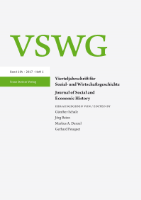
VSWG-Vierteljahrschrift fur Sozial-und Wirtschaftsgeschichte
Unveiling Historical Transformations in Social and Economic ContextsVSWG - Vierteljahrschrift für Sozial- und Wirtschaftsgeschichte is a distinguished academic journal published by Franz Steiner Verlag GmbH in Germany, focusing on the interdisciplinary fields of social and economic history. With an ISSN and E-ISSN of 0340-8728, this journal serves as a vital resource for scholars, researchers, and students interested in the complexities of socio-economic transformations across historical contexts. While it currently does not offer open access, its contributions are significant in raising critical discussions within cultural studies and economic history, as evidenced by its Q3 and Q4 rankings in various categories, including Cultural Studies and Sociology. Although the Scopus rankings reflect competitive standings, the journal continues to provide meaningful discourse and insights, supporting academic endeavors in an increasingly interconnected world.
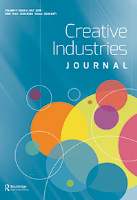
Creative Industries Journal
Transforming Ideas into Impactful ResearchCreative Industries Journal, published by Taylor & Francis Ltd, is a premier academic publication that focuses on the intersection of creativity, culture, and commerce. With an ISSN of 1751-0694 and an E-ISSN of 1751-0708, this journal has solidified its reputation in the fields of Communication, Cultural Studies, and Visual Arts, achieving impressive rankings in Scopus, including a 95th percentile in Visual Arts and Performing Arts. Since its inception in 2011, the journal has served as an integral platform for researchers, professionals, and students keen on exploring the innovative practices and dynamics that define the creative industries. With an emphasis on interdisciplinary approaches, the journal is committed to advancing scholarship and dialogue around the evolving landscape of cultural production and technological innovation, aiming to shape the future of creative practices. As an essential resource for anyone engaged in these fields, the Creative Industries Journal continues to foster critical discourse and disseminate groundbreaking research.

International Journal of Cultural Policy
Navigating the Complexities of Cultural PolicyThe International Journal of Cultural Policy, published by Routledge Journals, Taylor & Francis Ltd, is a prestigious platform dedicated to advancing scholarship in the fields of cultural studies and sociology, establishing itself as a leading resource for researchers, professionals, and students engaged in exploring the intersection of culture, policy, and society. Since its inception in 1997, the journal has consistently achieved high-impact standings, currently classified in the Q1 category for both Cultural Studies and Sociology and Political Science, making it essential reading for those interested in the nuances of cultural governance and policy-making. With a remarkable Scopus rank placing it in the top percentile of related journals, it facilitates the dissemination of innovative research that tackles contemporary cultural challenges. While the journal is not open access, it remains an invaluable resource, offering a rich archive of theoretical and empirical studies critical for understanding the dynamic interplay of culture and policy across varied contexts. We highly recommend it for those seeking to enhance their knowledge and contribution to this vibrant field of study.
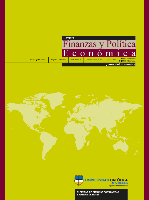
Revista Finanzas y Politica Economica
Advancing Open Access to Economic KnowledgeRevista Finanzas y Política Económica, published by UNIV CATOLICA COLOMBIA, FAC ECONOMIA, stands as a pivotal open-access platform since 2007 for scholars and practitioners in the fields of finance and economics. With an ISSN of 2248-6046 and an E-ISSN of 2011-7663, this journal is a vital resource for those looking to explore contemporary financial theories, economic policies, and their practical implications in Latin America and beyond. The journal is categorized in the fourth quartile in both Economics and Econometrics and Finance as of 2023, reflecting its growing significance in the academic community, despite its current Scopus rankings in lower percentiles. Situated in Bogotá, Colombia, at AV CARACAS 46-72, this publication facilitates the exchange of innovative ideas while supporting open access initiatives, ensuring researchers, students, and professionals have free entry to cutting-edge knowledge in these disciplines. The journal's commitment to fostering scholarly communication is evident in its converging years from 2015 to 2024, allowing for a dynamic dialogue on evolving financial and economic trends.

China Information
Unveiling the Interplay of Arts, Humanities, and Social Sciences in ChinaChina Information, published by SAGE Publications Inc, stands as a premier academic journal in the realms of the Arts and Humanities, Economics, and Social Sciences. With an ISSN of 0920-203X and an E-ISSN of 1741-590X, this journal has established itself as a significant resource for scholars interested in the interplay of culture, economy, and society within the context of China. Ranking in the Q1 category across multiple disciplines, including General Arts and Humanities (4th out of 173), Economics, and General Social Sciences (both holding the 63rd and 64th positions in their respective categories), the journal upholds a distinguished impact in academic research, making it a valuable repository of knowledge. Collectively peer-reviewed contributions since its inception in 1986 enrich its comprehensive coverage and facilitate cutting-edge discussions relevant to contemporary China and its global interactions. While it does not offer Open Access, the journal continues to thrive as a beacon for dedicated researchers, professionals, and students seeking to deepen their understanding of China's evolving landscape and its implications.
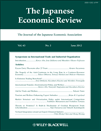
JAPANESE ECONOMIC REVIEW
Illuminating trends in Japanese economics for global impact.Japanese Economic Review, published by Springer Heidelberg, is a renowned academic journal that aims to advance the understanding of economic processes within the context of Japan and the Asia-Pacific region. With an ISSN of 1352-4739 and E-ISSN of 1468-5876, this journal features high-quality research articles that span a broad range of topics in economics and econometrics. Ranked in the Q2 category for Economics and Econometrics as of 2023, it holds a Scopus rank of #332 out of 716, placing it in the 53rd percentile among its peers. Although not Open Access, the journal invites contributions that provide insights and empirical analyses beneficial to both academics and practitioners. Emphasizing a deep understanding of economic dynamics, the Japanese Economic Review is essential reading for anyone interested in the implications of economic policies and trends, making it a significant platform for scholarly dialogue and research dissemination.
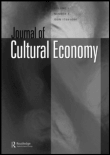
Journal of Cultural Economy
Advancing Interdisciplinary Insights in Cultural StudiesThe Journal of Cultural Economy, published by Routledge Journals, Taylor & Francis Ltd, is a premier academic resource for researchers and practitioners in the field of Cultural Studies. With an ISSN of 1753-0350 and an E-ISSN of 1753-0369, this Journal has established itself as a critical forum for innovative scholarship, ranking in the top Q1 category for Cultural Studies as of 2023. Covering the converged years from 2010 to 2024, the Journal plays a vital role in advancing interdisciplinary discussions that address the intersections between culture, economics, and society. Its impressive Scopus rank places it at #65 out of 1304 journals, reflecting its influence within the 95th percentile of the field. Although it does not currently offer open access options, the Journal's contribution to cultural discourse is invaluable for those pursuing cutting-edge research and applications in social sciences.

Review of Economic Analysis
Pioneering Open Access for Groundbreaking Economic DiscoveriesReview of Economic Analysis is a distinguished open-access journal published by DIGITAL INITIATIVES, UNIVERSITY OF WATERLOO, that has been committed to disseminating high-quality economic research since its inception in 2009. Renowned for its rigorous peer-review process, the journal provides a platform for innovative findings in the field of Economics and Econometrics. With an impact factor that underlines its relevance in academic circles, the journal continues to uphold scholarly excellence, currently classified in the Q3 category (2023) within the Economics and Econometrics domains, ranking #549 out of 716 in Scopus. The open-access model ensures that critical research is accessible globally, fostering collaboration and knowledge-sharing among researchers, professionals, and students. Interested contributors and readers can connect with the journal's vibrant academic community based in Waterloo, Canada, and explore a diverse array of articles that push the boundaries of economic analysis and understanding.

Luxury-History Culture Consumption
Navigating the Complexities of Luxury MarketsLuxury-History Culture Consumption, published by Routledge Journals, Taylor & Francis Ltd, is an esteemed journal dedicated to exploring the multifaceted intersections of luxury, culture, and consumer behavior. With an ISSN of 2051-1817 and an E-ISSN of 2051-1825, this journal provides a vital platform for researchers, academics, and industry professionals to examine the evolving narratives of luxury in historical and contemporary contexts. By fostering interdisciplinary dialogue, the journal addresses critical issues related to consumption patterns, cultural influences, and the societal implications of luxury markets. As luxury continues to shape cultural identities globally, this journal plays a crucial role in advancing knowledge and understanding within the field, making it an essential read for those engaged in the study of consumer behavior and cultural trends.
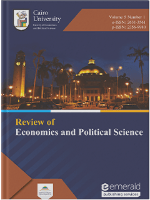
Review of Economics and Political Science
Exploring the nexus of economics and politics.Review of Economics and Political Science, an esteemed publication by EMERALD GROUP PUBLISHING LTD, stands at the forefront of interdisciplinary research, exploring the intricate relationships between economics, political science, and societal dynamics. Since its transition to an Open Access format in 2018, the journal has provided global accessibility to cutting-edge research, fostering a rich dialogue among scholars and practitioners in the fields of Applied Mathematics, Econometrics, and Political Science. With a commendable Q2 ranking in multiple categories including Economics and Political Science, the journal offers a robust platform for high-impact studies that drive innovation and policy development. Located in the United Kingdom, it caters to an international audience and actively contributes to the academic discourse, as evidenced by its solid performance in Scopus rankings. Researchers, professionals, and students alike will find invaluable insights within its pages, making it a vital resource for understanding contemporary economic and political challenges.